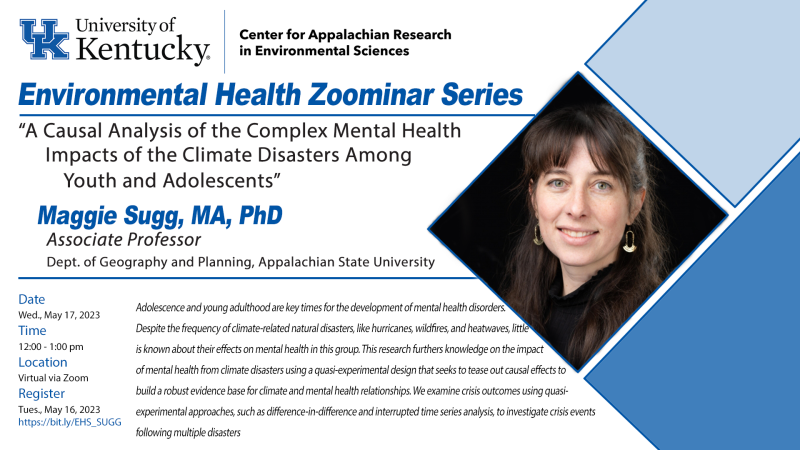May 17, 2023 12:00pm
-
1:00pm
WEBINAR: "A Causal Analysis of the Complex Mental Health Impacts of the Climate Disasters Among Youth and Adolescents" by Dr. Maggie Sugg
Event Details
Location: Online Event Category: Seminar
Additional Event Information
Dr. Maggie Sugg is an Associate Professor in the Department of Geography & Planning at Appalachian State University. Her research focuses on the spatiotemporal patterns of environmental health illnesses and how these patterns relate to environmental, socioeconomic, and climatic determinants. Dr. Sugg has 65 publications on the intersection of climate and public health. She is a recipient of the National Science Foundation CAREER award and the Environmental Protection Agency's STAR fellowship in Public Health and funding from the National Institute of Environmental Health Sciences (NIEHS), the National Science Foundation (NSF), and the American Foundation for Suicide Prevention (AFSP).
Adolescence and young adulthood are key times for the development of mental health disorders. Despite the frequency of climate-related natural disasters, like hurricanes, wildfires, and heatwaves, little is known about their effects on mental health in this group. This research furthers knowledge on the impact of mental health from climate disasters using a quasi-experimental design that seeks to tease out causal effects to build a robust evidence base for climate and mental health relationships. We leverage our longstanding partnership with Crisis Text Line (CTL), a global not-for-profit organization providing free, 24/7, confidential text-based crisis response service. CTL currently has the world's largest repository of mental health data and, unlike other data sources, can provide data in real-time. We examine crisis outcomes using quasi-experimental approaches, such as difference-in-difference and interrupted time series analysis, to investigate crisis events following multiple disasters, including Hurricane Harvey (2017), Hurricane Ida (2021), the 2020 Widlfires, Hurricane Florence (2018), and the 2021 Texas Winter weather event. Our results demonstrate a sustained increase in crisis outcomes; however, specific outcomes like thoughts of suicide and/or stress/anxiety alter in frequency depending on the length of time after an initial disaster event. Our findings highlight a new application for text-based crisis support services to address the mental health consequences in youth following a climate-related disaster and the potential for these types of crisis platforms to measure situational awareness in impacted communities.
Event Images
